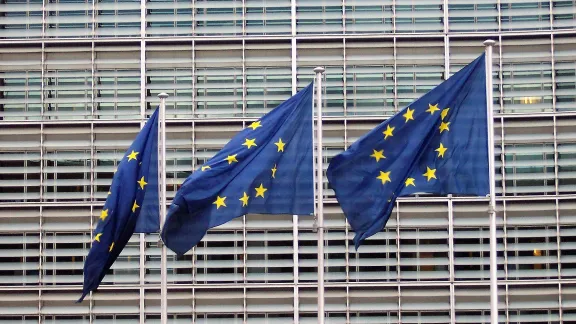
Churches are invited to pray for Europe in the run-up to the EU Parliament elections taking place in member countries between 23 and 26 May. Photo: TeaMeister, under Creative Commons license (CC-BY-NC)
German church offers sermon and liturgy
(LWI) – As voters in the European Union (EU) prepare to elect their representatives to the EU Parliament between 23 and 26 May, the Evangelical Lutheran Church in Northern Germany (ELCNG) has offered liturgical materials to guide worship services in the run-up period.
Prepared in collaboration with the partner churches in England, Latvia, Poland and the Netherlands, the liturgy includes a sermon, and makes reference to the influence of populist tendencies on Europe’s political life.
“In ecumenical bonds on both sides of all borders, new and old, let us pray … for peace and freedom, justice and democracy in Europe and the world! Let us listen to one another, respond to each other’s hopes and fears, and come before God in prayer,” the ELCNG Bishops’ Council says in a letter inviting congregations to use the liturgy. Rogation Sunday (from the Latin admonition to “pray”) this year falls on 26 May which is the election day in Germany.
Prior to the elections, from 3 to 12 May, many of the 28 EU member states will celebrate Europe Week, which takes place every year to mark the founding of the Council of Europe on 5 May 1949 and the signing of the European Coal and Steel Treaty on 9 May 1950. Both dates are also known as Europe Day.
In many European countries anxiety plays a major role in political life. Populist groups work on people’s fears in order to achieve their goals.
In her introduction to the liturgy, ELCNG Europe secretary Rev. Christa Hunzinger writes: “In many European countries, anxiety plays a major role in political life. Populist groups work on people’s fears in order to achieve their goals. The text for the sermon on the Sunday of the European elections contains a verse that may help to allay such fears. Jesus says: ‘In the world you will have trouble. But take heart! I have overcome the world’ (John 16:33).”
The ELCNG has partnerships with churches in ten European countries. They include the three Church of England dioceses of Ely, Durham and Lichfield; the Evangelical Church of the Augsburg Confession in Poland with its dioceses of Wroclaw and Pomorski-Wielkopolska; the Estonian Evangelical Lutheran Church, the Evangelical Lutheran Church of Latvia, the Evangelical Lutheran Church of Lithuania, the Evangelical Lutheran Church in Romania and the Evangelical Lutheran Churches in Kazakhstan part of the Federation of Evangelical Lutheran Churches in Russia and Other States; Växjo diocese of the Church of Sweden, the Protestant Church in the Netherlands and the St. Petersburg eparchy (province) of the Russian Orthodox Church.
The intercessory prayers bring concerns form the respective countries. The diocese of Lichfield begins : “God, we in Britain look with concern at the divisions in our society that have come to the surface through the discussion about Brexit.” The ELCNG partner church in Poland continues: “We look to the earth that you have entrusted to us and that is our home.” The Dutch church is worried that “growing political populism will poison hearts and distort the way we see the essential human questions about living together.” The partner church in Latvia prays: “We are witnessing cases of fake news and tendentious debates” and calls for “clarity and a critical mind.”


